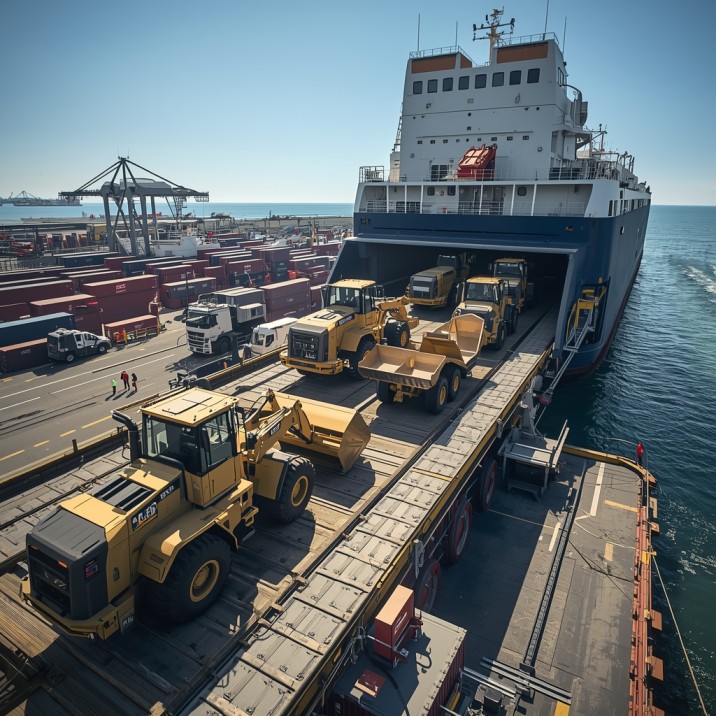Shipping vehicles and rolling cargo from the United States to Bahamas is increasingly in demand; as a result, RoRo Shipping to Bahamas has become one of the most efficient export solutions available today. Whether you require RoRo Equipment Shipping to Bahamas for construction, agricultural, or industrial machinery, or RoRo Boat Shipping to Bahamas for vessels on trailers or cradles, or even RoRo RV Shipping to Bahamas for motorhomes and towable campers, or RoRo Oversized Cargo to Bahamas for out-of-gauge and non-containerized loads, Roll-On / Roll-Off shipping consistently delivers a proven, cost-effective method. Moreover, Bahamas’s modern port infrastructure and strong EU trade connectivity further support smooth, reliable imports.
🚢 Ship with Confidence. Partner with world-renowned NVOCCs and leading global ocean carriers.
👉 Get a Rate: https://alltransportdepot.com/roro-shipping-cost/
👉 Place Your Order: https://alltransportdepot.com/place-order/
📲 WhatsApp: +1 (470) 791-4497 | 📞 Call: +1 (678) 528-5794 | 📧 ship@alltransportdepot.com
All TransportDepot Inc. — FMC Licensed & Bonded NVOCC #021693
RoRo Shipping to Bahamas – Vehicles, Equipment, Boats, RVs & Oversized Cargo
Shipping rolling cargo from the United States to Bahamas continues to increase as demand grows for American vehicles, machinery, recreational units, and project cargo. As a result, Roll on Roll of Shipping to Bahamas has become one of the most efficient and cost-effective export methods available. Whether clients require RoRo Equipment Shipping to Bahamas, RoRo Boat Shipping to Bahamas, RoRo RV Shipping to Bahamas, or RoRo Oversized Cargo to Bahamas, Roll-On / Roll-Off transport delivers a streamlined solution supported by modern European port infrastructure and consistent sailing schedules.
Why Choose Roll on Roll Off Shipping to Bahamas
RoRo shipping moves vehicles and rolling cargo directly onto specialized vessels. Instead of containerizing cargo, operators drive or tow units onboard and secure them for ocean transit. Consequently, Drive-On / Drive-Off Ocean Shipping to Bahamas reduces handling time, lowers port costs, and minimizes the risk of damage.
Moreover, RoRo services provide predictable transit times and flexible loading options. Therefore, exporters frequently rely on International RoRo Shipping Services to Bahamas for both private and commercial shipments.
Key Advantages
-
Lower shipping costs compared to containers
-
Faster port operations and vessel turnaround
-
Reduced handling and lifting exposure
-
Ideal for operational vehicles and machinery
RoRo Equipment Shipping to Bahamas – Vehicles & Heavy Machinery
RoRo Shipping for Vehicles and Equipment to Bahamas supports a wide range of rolling cargo across construction, agriculture, mining, and industrial sectors. Because many machines remain self-propelled, RoRo offers a practical alternative to flat rack or container shipping.
Shippers commonly use RoRo to:
-
Ship excavators, bulldozers, and wheel loaders
-
Export tractors and farm equipment
-
Move drilling equipment and industrial machinery
-
Ship heavy equipment overseas to Bahamas efficiently
In addition, when equipment exceeds standard rolling limits, Lift-On Cargo Shipping by RoRo to Bahamas allows cranes to place cargo onto MAFI trailers for secure transport.
🚢 Ship with Confidence
Partner with world-renowned NVOCCs and leading global ocean carriers.
👉 Get a Rate: https://alltransportdepot.com/roro-shipping-cost/
👉 Place Your Order: https://alltransportdepot.com/place-order/
📲 WhatsApp: +1 (470) 791-4497
📞 Call: +1 (678) 528-5794
📧 ship@alltransportdepot.com
All TransportDepot Inc. — FMC Licensed & Bonded NVOCC #021693
RoRo Boat Shipping to Bahamas – Boats & Yachts Without Containers
Many vessel owners choose RoRo Boat and Yacht Shipping to Bahamas when transporting boats on trailers or cradles. Because the cargo remains rolling, RoRo eliminates the need for container loading.
This method works well for:
-
Shipping boats overseas by RoRo to Bahamas
-
Transporting yachts without containers
-
Moving boats on trailers as rolling cargo
-
Handling international RoRo boat shipping to Bahamas
As a result, RoRo often represents the best way to ship a boat by RoRo to Bahamas, particularly when cost efficiency and reduced handling matter.
RoRo RV Shipping to Bahamas – Motorhomes & Towable Units
RoRo RV, Motorhome, and Trailer Shipping to Bahamas provides a reliable option for oversized recreational vehicles. Since most RVs cannot fit inside standard containers, RoRo offers a direct and compliant solution.
Typical shipments include:
-
RVs and motorhomes
-
Travel trailers and campers
-
Towable and fifth-wheel trailers
-
Off-road campers and specialty builds
Furthermore, RoRo accommodates single-axle trailers and tandem-axle trailers, subject to port and vessel approval.
🚢 Ship with Confidence
Partner with world-renowned NVOCCs and leading global ocean carriers.
👉 Get a Rate: https://alltransportdepot.com/roro-shipping-cost/
👉 Place Your Order: https://alltransportdepot.com/place-order/
📲 WhatsApp: +1 (470) 791-4497
📞 Call: +1 (678) 528-5794
📧 ship@alltransportdepot.com
All TransportDepot Inc. — FMC Licensed & Bonded NVOCC #021693
RoRo Oversized Cargo to Bahamas – MAFI & OOG Solutions
When cargo exceeds container dimensions, RoRo Shipping for Oversized Cargo to Bahamas becomes essential. In these cases, carriers use MAFI trailers to move heavy and out-of-gauge units safely.
This solution supports:
-
Oversized and OOG cargo
-
Cargo too large for standard containers
-
Heavy project machinery
-
Non-containerized industrial equipment
Therefore, many exporters rely on RoRo as the best way to ship oversized cargo by RoRo using MAFI to Bahamas.
U.S. Ports Serving RoRo Shipping to Bahamas.
RoRo shipments depart from multiple U.S. ports depending on cargo location and vessel schedules. In most cases, exporters select East Coast ports to reduce transit time. However, West Coast options remain available, especially when cargo originates inland or requires specific sailing schedules. As a result, shippers can choose the most efficient departure point based on cost, timing, and vessel availability.
Common departure ports include:
Major RoRo Ports in the Bahamas
The Bahamas features several key seaports facilitating international vehicle and cargo shipments; nevertheless, each port specializes in different cargo types, destinations, and handling capabilities.
-
Port of Freeport (https://www.bahamasports.com/freeport)
This port serves as the primary RoRo hub for Grand Bahama Island and northern Bahamas. Therefore, most RoRo Equipment Shipping to the Bahamas, RoRo Shipping for Vehicles and Equipment to the Bahamas routes are routed through Freeport. Additionally, the port efficiently handles trailers, heavy machinery, and rolling cargo. Consequently, it remains the preferred choice for Drive-On / Drive-Off Ocean Service. -
Port of Nassau (https://www.bahamasports.com/nassau)
Meanwhile, Nassau supports mixed cargo and selective RoRo services for New Providence Island. Hence, it is ideal for exporters shipping vehicles, light equipment, or specialty cargo when International RoRo Shipping Services to the Bahamas require proximity to the capital city. -
Port of Marsh Harbour (https://www.bahamasports.com/marshharbour)
Similarly, Marsh Harbour plays a vital role in RoRo Machinery Shipping to the Bahamas, especially for industrial and project cargo. Furthermore, shippers frequently use this port to Ship Heavy Equipment Overseas to the Bahamas, benefiting from specialized vehicle-handling infrastructure. -
Port of George Town (https://www.bahamasports.com/georgetown)
By contrast, George Town primarily focuses on bulk and container cargo. However, it occasionally supports RoRo shipments for oversized or project cargo. As such, exporters sometimes select George Town for Cargo Too Large for Containers Shipping to the Bahamas, depending on vessel schedules and cargo specifics.
Overall, although the Bahamas operates several capable ports, vehicles, equipment, RVs, boats, and oversized cargo most commonly transit through Freeport, especially when the final destination is Grand Bahama Island or northern Bahamas.
Why Ship with All TransportDepot Inc.
All TransportDepot Inc. is a FMC Licensed & Bonded NVOCC (#021693) specializing in RoRo exports from the USA to the Caribbean. From start to finish, we manage the entire process, including inland pickup, port coordination, vessel loading, and export compliance. As a result, our clients benefit from a streamlined, reliable, and transparent shipping experience.
Why Clients Choose Us
-
First and foremost, we operate as a licensed U.S. exporter fully compliant with all regulations.
-
In addition, we bring extensive experience handling Caribbean RoRo shipments across multiple ports.
-
Moreover, we offer transparent pricing so clients can plan confidently without unexpected fees.
-
At the same time, we provide flexible door-to-port and port-to-port shipping options.
-
Finally, we ensure fast AES filings and accurate export documentation to avoid delays and guarantee smooth vessel loading.
Why Ship with All TransportDepot Inc.
All TransportDepot Inc. is a FMC Licensed & Bonded NVOCC (#021693) specializing in RoRo exports from the USA to Europe. From start to finish, we manage the entire process, including inland pickup, port coordination, vessel loading, and export compliance. As a result, our clients experience a streamlined, reliable, and transparent shipping process.
Why Clients Choose Us
-
First and foremost, we operate as a licensed U.S. exporter with full regulatory compliance.
-
In addition, we bring proven experience handling European RoRo shipments across multiple ports.
-
Moreover, we provide transparent pricing, allowing clients to plan confidently without hidden costs.
-
At the same time, we offer flexible door-to-port and port-to-port shipping solutions.
-
Finally, we complete fast AES filings and export documentation, which helps prevent delays and ensures smooth vessel loading.
🚢 Ship with Confidence
Finally , Partner with world-renowned NVOCCs and leading global ocean carriers.
👉 Get a Rate: https://alltransportdepot.com/roro-shipping-cost/
👉 Place Your Order: https://alltransportdepot.com/place-order/
📲 WhatsApp: +1 (470) 791-4497
📞 Call: +1 (678) 528-5794
📧 ship@alltransportdepot.com
All TransportDepot Inc. — FMC Licensed & Bonded NVOCC #021693

David is a seasoned logistics coordinator at Miami Auto Shippers. With over a decade of experience, he excels in organizing the smooth and efficient transportation of vehicles. He’s known for his attention to detail and ensuring every car reaches its destination safely.



